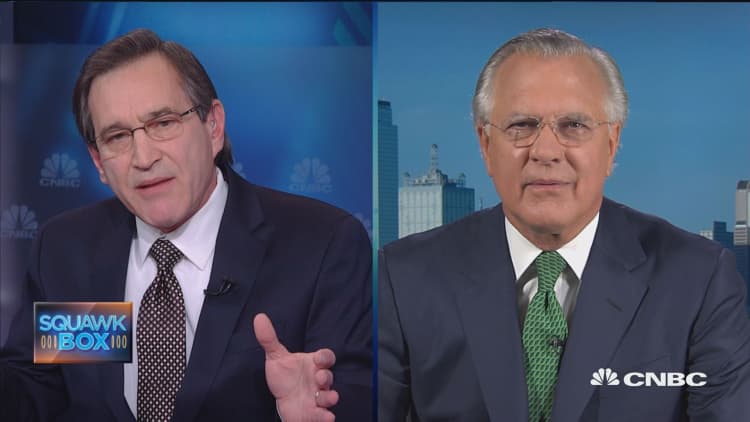
If the anti-free trade rhetoric by Republican front-runner Donald Trump on the "extreme right" and Democratic candidate Sen. Bernie Sanders on the "extreme left" were to become U.S. policy, the economy would suffer greatly, said Richard Fisher, who retired as Dallas Fed president last year and served as deputy U.S. trade representative during the presidency of Bill Clinton.
"Protectionism is the crack cocaine of economics. We know that it gives you a high. But it can be super-deadly, economically speaking," Fisher told CNBC's "Squawk Box" on Monday.
Currently a senior advisor to British banking giant Barclays, Fisher said there's a long history showing that taxing foreign goods in an attempt to affect a level playing field on trade does not work. "We know about Smoot-Hawley, which was a tariff imposed deep in the Great Depression and actually drove the world into depression."
Sponsored by Utah Sen. Reed Smoot and Oregon Rep. Willis Hawley, the Tariff Act of 1930 raised U.S. tariffs to historically high levels.
Fisher said the case against isolationist trade policy goes back even further. "Benjamin Harrison ran for the presidency [in 1888] on a protectionist, high tariff, same kind of rhetoric you hear today. He won. And we went into one of the great depressions of all time ... which lasted longer than the Great Depression that we talk about."
Fast forward to present day, Fisher said the arguments about job-killing free trade deals by Trump and Sanders do not hold up. "I really fault the bad fiscal policy of the federal government across the board" for job losses, he contended, saying blanket statements blaming trade are a smoke screen.
"We have quadrupled [in the U.S.] our manufacturing goods since 1980. Over half of what we manufacture in the United States … is exported to other countries. You cut off other countries from coming into here, they'll cut us off from going there," Fisher said.
"You can't just cut this stuff off and use the rhetoric that the extreme right and the extreme left is using here," he warned.
Fisher praised George H.W. Bush and Bill Clinton as two of the best ever presidents on trade. Bill Clinton ran for the White House on a free trade platform. "It was brave of Bill Clinton to run the way he did. I wish other candidates, including his own wife, had that kind of toughness to them," Fisher said.
Democratic front-runner Hillary Clinton's stance on trade would be best described as more nuanced than the views of Sanders and Trump.
While the North American Free Trade Agreement was enacted in Bill Clinton's presidency, Hillary Clinton as a senator a decade later voted against a free trade deal with Central America.
As President Barack Obama's secretary of state, Hillary Clinton helped negotiate the Trans-Pacific Partnership with Japan, Vietnam and other Pacific Rim countries.
However, Clinton, as a presidential candidate, has said after reading the final language of the TTP deal she would vote against it because it does not adequately protect U.S. workers.
— Reuters contributed to this report.





